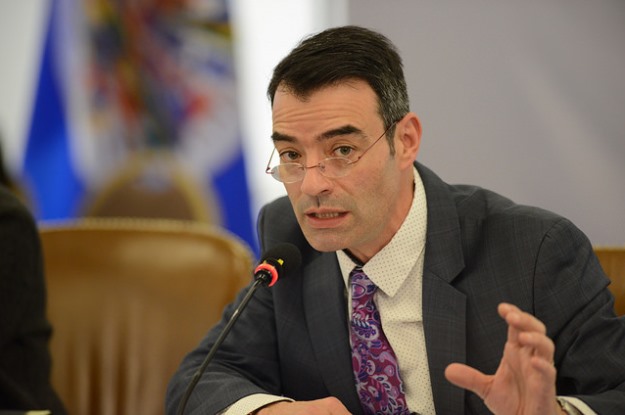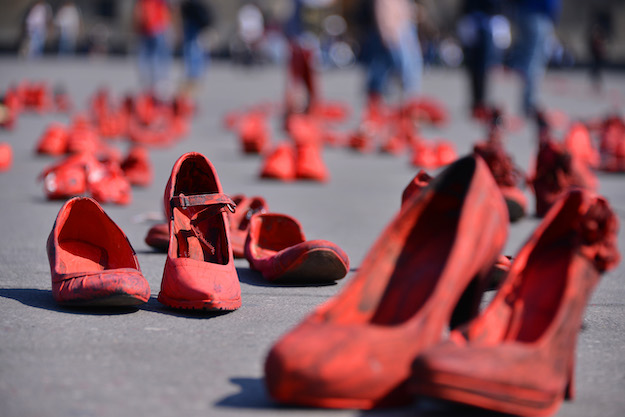As president of the Inter-American Commission on Human Rights (IACHR), as well as the group’s rapporteur for Mexico, James Cavallaro has been a driving force behind investigating what happened to the 43 Mexican college students who disappeared in September 2014. And he doesn’t pull punches in saying that the Mexican government failed to cooperate with the IACHR’s panel of international experts that was sent to investigate the case.
“The way this case has been handled by Mexican authorities, and the way they pressed and created a situation that made it impossible for the expert group to continue is galling. It’s galling in the face of the fact that you still have 43 parents who don’t know what happened to their sons,” said Cavallaro, who is also a professor of law at Stanford University and the founding director of the school’s International Human Rights and Conflict Resolution Clinic.
Cavallaro spoke with AQ about why the IACHR opted not to extend the expert group’s mandate last month, and what might come of a scheduled meeting with Mexican government officials this week; Mexico’s foreign secretary called the meeting a chance to “establish mechanisms to follow up on [the group’s] report” and “reaffirm” the government’s commitment to finding out what happened to the students.
The transcript was edited for length and clarity, with hyperlinks added for additional context.
Americas Quarterly: Mexico’s attorney general has called this “the most comprehensive criminal investigation in the history of law enforcement in Mexico.” What does that say about law enforcement in Mexico?
James Cavallaro: Unfortunately, given the results of the investigation, it’s quite a damning statement. It’s a damning statement because we don’t know what happened to the 43 students, we don’t know where they are, we don’t know who was responsible, we don’t know how they died. None of the most important questions have been answered. And if that’s what the most comprehensive investigation in the recent history of Mexico can produce, any rational observer should be extremely concerned about the state of criminal justice in Mexico.
AQ: Why was the investigatory mandate for the IACHR’s expert panel ended on April 30?
JC: Because the Mexican government was not cooperating. Because the Mexican government would not allow the expert group to visit the 27th battalion. Because the Mexican government would not allow the expert group to interview the military. Because the expert group was subjected to a significant campaign of defamation and smearing which the government stated that it was not responsible for. The Mexican government asserted that it had no responsibility for the smear campaign. That’s an issue worth examining. There are those who doubt that assertion. Me, I’m a commission member, I have to take what the Mexican government says at face value until I have absolute or clear evidence to the contrary. But there are certainly suggestions and doubts about that assertion.
AQ: Is it clear to you that there is a government cover-up here?
JC: I don’t want to make any conclusions about what I think happened, but what I will say is that the experts who follow this quite closely demonstrated in evidence that is of record, that is in the reports, that the official version is physically impossible, the six people who talk about the garbage dump are internally contradictory, 77 percent of those who were in the original investigation had numbers of physical injuries after their detention… You have evidence upon evidence upon evidence that the official initial narrative is physically impossible and involves physical injury – i.e. beatings of detainees – to tell a narrative that is not accurate, that excludes significant evidence about a fifth bus, and that excludes evidence from the C4 or the recorded conversations that show that not just the local police and the mayor, but the other local police in a neighboring town and also the state police, the federal police and the military are all following the events and involved with them throughout the night. And then you get a version that is radically different, that picks out a handful of nobodies and puts the blame on them and tries to close the case.
… There are so many gross errors, and then so much obstructionism afterwards, I’m not going to reach the conclusion that there’s bad faith, that there’s a cover-up, that there was a montaje from the beginning to protect higher-level authorities, I can’t say that – but many other people would say that based on the evidence.
AQ: You sound exasperated.
JC: It’s hard not to be. Oh my Lord, it’s hard not to be. I know this case because I’ve been in the weeds… The way the case has been handled is galling. It’s galling. I can’t use an adjective less than that. And I’m happy to be on the record saying that. The way this case has been handled by Mexican authorities, and the way they pressed and created a situation that made it impossible for the expert group to continue is galling. It’s galling in the face of the fact that you still have 43 parents who don’t know what happened to their sons.
AQ: Mexico’s Foreign Ministry has agreed to meet later in May with the Inter-American Commission on Human Rights. What do you hope for this meeting and could it lead to a reopening of the investigation?
JC: The investigation is still open, the issue is whether the investigation will be conducted in a way that leads it to the truth or is conducted in a way that leads it back down the rabbit hole of the initial false version, and that’s going to depend on pressure. We hope that we can create a follow-up mechanism that is sufficiently engaged to press the authorities to continue with a meaningful investigation. We hope there’s enough pressure from media, we hope there’s enough pressure from Mexican civil society, from the families and from others to ensure a meaningful investigation. That’s what’s at stake. And the follow-up mechanism is a part of that. The investigation is formally open, it hasn’t been closed and shelved. The question is which direction it’s headed.
AQ: You mentioned the word “hope.” Do you have any hope left for this investigation and getting to the bottom of this?
JC: I have been working in human rights for over 25 years, and largely that’s because I maintain hope even in the face of extraordinarily challenging circumstances. So I would say here I maintain hope in the face of extraordinarily challenging circumstances.
—
Kurczy is a special correspondent for AQ.







